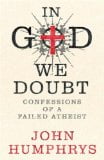 In God We Doubt: Confessions of a Failed Atheist
In God We Doubt: Confessions of a Failed Atheist
by John Humphrys
Hodder & Stoughton, £18.99, ISBN 978-0-340-95126-2
John Humphrys, fierce political interviewer and question master of Mastermind, interviewed representatives of the three main monotheistic religions, the Chief Rabbi, the Archbishop of Canterbury and a Muslim academic, in the radio series Humphrys in Search of God.
The huge response got him thinking, and this book is the result. He tells us that he was brought up a Christian and prayed every day for most of his life, began to doubt, but cannot shake off the idea that there is Something There – hence his title and sub-title (the latter raised fears that it was an I-was-wicked-but-found-God story, so I was glad to find it isn’t). He raises questions of the kind which have troubled people for centuries, in his case from Aberfan to Beslan, asking why God let them happen – the dreadful difference being, as he says, that while Aberfan was an accident, Beslan came about through deliberate action.
The recent spate of anti-religion books by Dawkins, Hitchens et al. gives him much to chew on, and he chides the fiercer critics of religion who insist that all religious belief is delusion, quoting Archbishop William Temple: “If you talk to God you are praying; if God talks to you, you have schizophrenia”.
Cargo cults, Pascal’s wager, Bertrand Russell’s teapot and the problems presented to Christians and Jews by the repellent parts of the Old Testament appear, as in Dawkins. Believers’ sometimes baffling logic gets some stick. Humphrys was assured that God alleviated the suffering caused by the 2005 Kashmir earthquake by holding off the snows; why didn’t he simply prevent the earthquake? Similarly, Dawkins asked why, if Our Lady of Fatima saved the Pope’s life after the assassination attempt, as he said, she didn’t simply stop the attempt. Humphrys tells of attending a Billy Graham meeting with a friend. The car broke down on the way. He lightly suggested God didn’t want him to go, and his friend said it was the Devil. The Mensa study showing an inverse relationship between intelligence and belief, and the fact that few members of the Royal Society believe in a personal god, are more significant than Humphrys maintains.
Humphrys’ statement that “by any civilised standards many Sharia punishments are barbaric” is particularly appropriate since I read it at the time of the fuss over the Archbishop of Canterbury suggestion that some aspects of Sharia might come to Britain. Humphrys is witty, with some nice jokes about discoveries of the Garden of Eden, Noah’s Ark, Jesus’s bones or tomb, or “that he had a brother or a son who played in defence for Bethlehem United”. And he says Tony Blair may have converted to Catholicism by the time his book is read – the man’s a prophet! Someone should tell him that the alien in Alien burst out of John Hurt’s chest, not Sigourney Weaver’s, that there is no actor called Leonard DiCaprio, and that Kate Winslet played a first-class passenger in Titanic. And this book’s (highly reputable) publishers should be ashamed for omitting an index.



